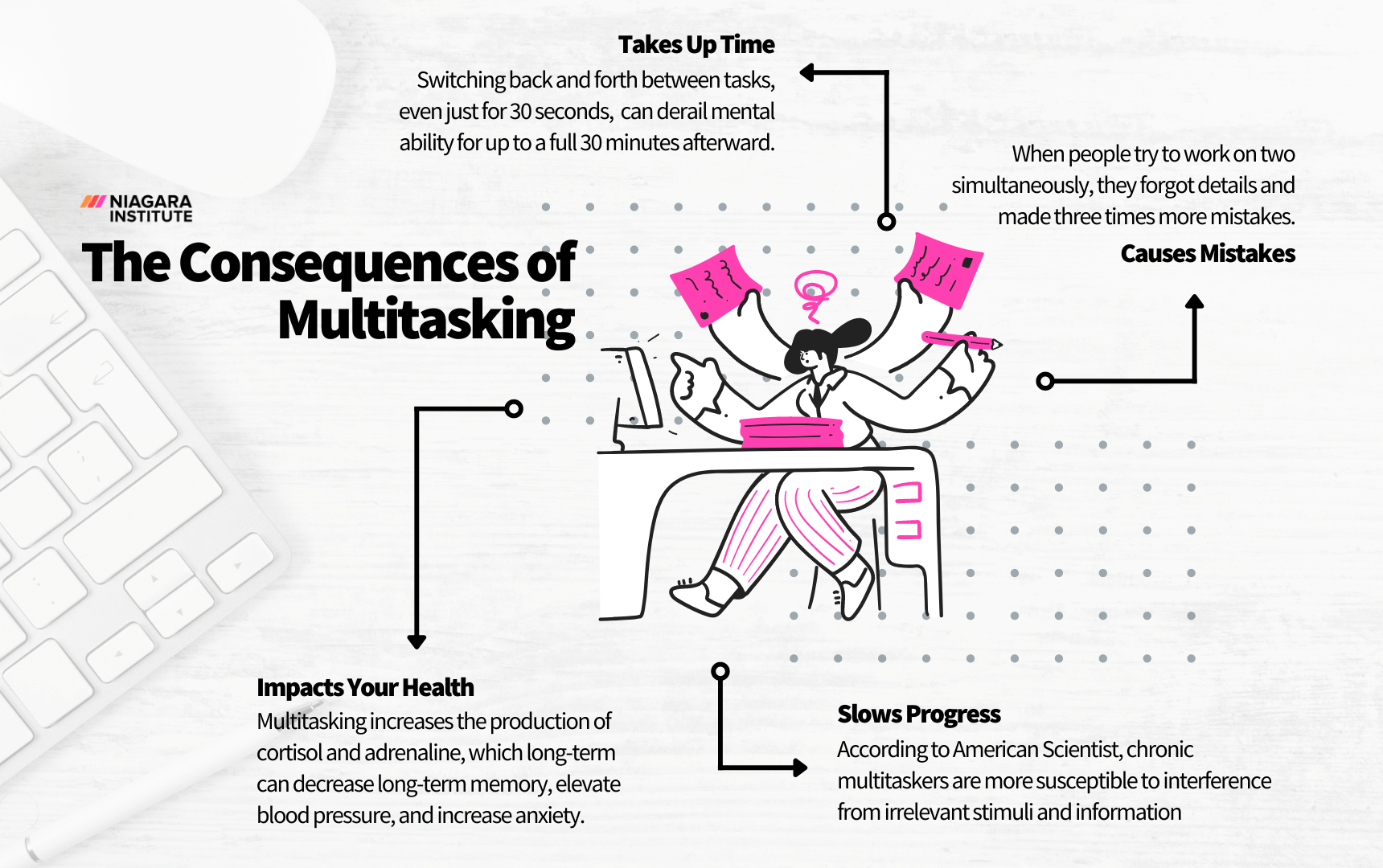6 min read
10 Productivity Tips That Instantly Help You Get More Done
Small incremental improvements can have a significant impact, and luckily, productivity is an area that can be influenced by little changes in how...
3 min read
 Michelle Bennett
:
Feb 14, 2023 6:00:00 AM
Michelle Bennett
:
Feb 14, 2023 6:00:00 AM
.png)
Do you feel an unspoken pressure to be good at multitasking at work? Have you been told over the years by your bosses, colleagues, and even the media, that multitasking is something to be proud of and to aspire to be good at?
If so, you’re not alone. According to an Asana study, nearly three in four employees (72%) feel pressure to multitask during the workday. Moreover, American Scientist points out that it is common for people who don’t consider themselves to be multitaskers to “feel alienated” for lacking this “ability.”
However, over the past decade, researchers have been questioning whether or not it really is a good thing to be a multitasker at work. Now, with numerous studies to refer to, the answer could not be more clear - multitasking isn’t all it’s cracked up to be.
In fact, multitasking as we know it isn’t even truly multitasking. According to neuropsychologist Cynthia Kubu, “When we think we’re multitasking, most often we aren’t really doing two things at once. But instead, we’re doing individual actions in rapid succession. This is called task-switching.”
In the following article, we’ll look at what else research has found out about being a multitasker, as well as provide four resources that will help you boost your productivity in an effective and healthy way.
Is it good to be a multitasker? As of today, recent research on the topic indicates that very few people are actually capable of multitasking and that ineffective multitasking can do more harm than good to your productivity.
While multitaskers may want to believe that simultaneously working on multiple things at once saves them time, the research says otherwise. In fact, “switching back and forth between tasks, even just taking thirty seconds to send a text, slows down and can even derail your mental ability for up to a full 30 minutes afterward.”
In a study conducted by INSERM, the French National Institute of Health and Medical Research, participants were asked to complete two tasks at the same time while undergoing an MRI. From those scans, it was found that when given two simultaneous goals and expected to multitask, participants “forgot details and made three times more mistakes.”
According to American Scientist, chronic multitaskers are more susceptible to interference from irrelevant stimuli and information. Moreover, those multitaskers also “perform more slowly on tests that required them to quickly switch between tasks. It seems that they are less able to filter out their knowledge of the previous task and look at things afresh.”
It has been found that multitasking increases the production of cortisol, the stress hormone, and adrenaline, the fight-or-flight hormone. While this can give you a temporary boost of energy, the Center for Inquiry warns that “if your cortisol and adrenaline remain high over prolonged periods, there can be negative health outcomes, including decreased long-term memory, elevated blood pressure, and increased anxiety.”

The fact is that being a multitasker is not the answer to better productivity. In fact, the American Psychological Association notes that “the mind and brain were not designed for heavy-duty multitasking. Psychologists tend to liken the job to choreography or air-traffic control, noting that in these operations, as in others, mental overload can result in catastrophe.”
Instead, you are better off learning to manage your time, prioritize tasks, set boundaries, and balance your workload. To help you do that, here are four helpful resources that you can immediately begin to use as you work to improve your productivity.
Time-blocking is when you break down your day into blocks of time (ex., 1-hour increments) and assign a single activity to each block. Typically, you start by penciling in non-negotiable activities such as breaks, meetings, and answering emails, so that you can quickly see how much time you have left in the day. From there, you look at your to-do list and fill in the remaining blocks of time with tasks and projects based on their level of urgency and importance.
When it comes to multitasking at work, it’s up to you to avoid falling into the trap and do what’s best for your productivity. This requires self-management. In this workbook, you’ll learn more about seven skills needed to manage yourself effectively, including organization, time management, resilience, and personal accountability.
Rather than rushing to try and do everything all at once, the best thing you can do for yourself is to take the time to prioritize the tasks on your to-do list based on their urgency and importance. Of course, this is often easier said than done, so to help you start doing so effectively, this article provides an explanation with examples and an editable template.
If you want to avoid burning out or causing yourself undue stress that affects your performance and productivity, you need to find ways to work smarter, not harder. This guide will provide you with eight ways to start taking control of your day so that you feel less pressure or need to multitask.

6 min read
Small incremental improvements can have a significant impact, and luckily, productivity is an area that can be influenced by little changes in how...

4 min read
It would be hard to find someone who hasn’t experienced moments at work where they’re overwhelmed by the sheer volume of tasks to complete. It’s the...

4 min read
There are countless reasons to want to stand out from the crowd at work. Some people want to be promoted to a people management position. For others,...